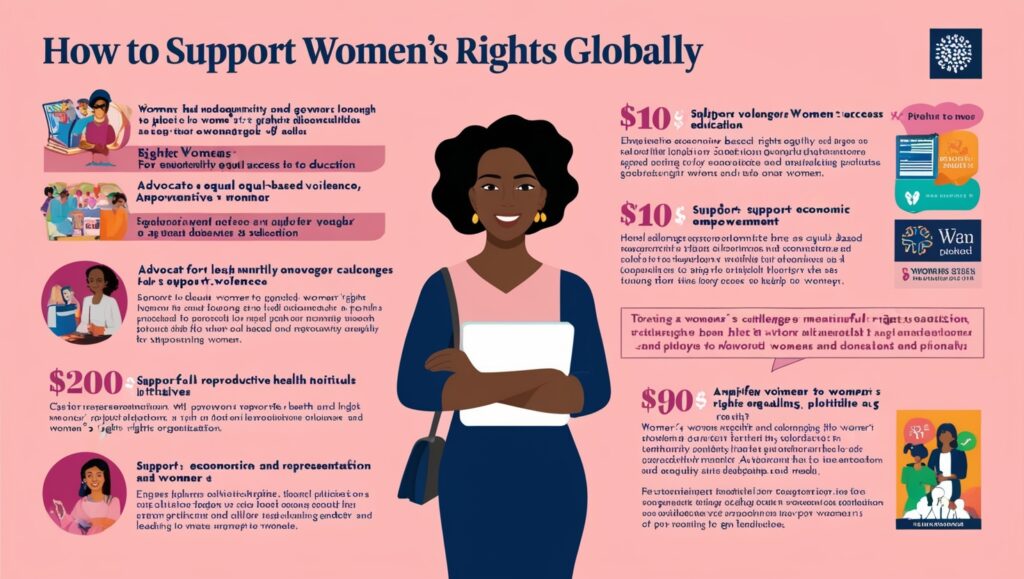How to Support Womens Rights Globally
Supporting women’s rights is essential for creating an equitable and just society. Despite significant progress, gender inequality persists in many parts of the world, manifesting in unequal access to education, healthcare, economic opportunities, and political representation. Addressing these disparities requires a collective effort from individuals, organizations, and governments alike.
This blog explores practical ways to support women’s rights globally, highlighting strategies to drive meaningful change and empower women everywhere.
Understanding Women’s Rights and Global Challenges
Women’s rights encompass fundamental freedoms and opportunities that enable women to live with dignity, equality, and autonomy. These rights include:
- Access to Education
- Equal Pay and Economic Opportunities
- Freedom from Violence and Discrimination
- Reproductive Health and Rights
- Political Participation
Challenges Women Face Worldwide:
- Education Inequality: Millions of girls are denied education due to poverty, early marriage, and cultural norms.
- Gender-Based Violence: Women face domestic violence, sexual harassment, and human trafficking.
- Workplace Discrimination: Women often experience unequal pay, limited opportunities, and harassment at work.
- Reproductive Health Issues: Many women lack access to essential healthcare and family planning resources.
- Lack of Representation: Women remain underrepresented in politics, leadership roles, and decision-making processes.
Addressing these issues requires global advocacy, grassroots efforts, and systemic change.
How to Support Women’s Rights Globally
1. Advocate for Equal Access to Education
Education is one of the most powerful tools for empowering women and breaking the cycle of poverty.
- Support Organizations: Donate to or volunteer with groups like Malala Fund, CARE International, or Girls Not Brides, which advocate for girls’ education.
- Raise Awareness: Use social media and community platforms to highlight the importance of educating girls.
- Mentorship Programs: Participate in mentorship initiatives that support young women in pursuing education and careers.
2. Promote Economic Empowerment
Economic independence is critical for women’s rights and equality.
- Support Women-Owned Businesses: Purchase products or services from female entrepreneurs, especially in underprivileged areas.
- Advocate for Equal Pay: Encourage policies that promote pay transparency and eliminate gender wage gaps.
- Provide Microloans: Support microfinance initiatives that help women start or grow small businesses.
3. Stand Against Gender-Based Violence
Violence against women is a global crisis that requires urgent action.
- Support Shelters and Hotlines: Donate to organizations that provide safe havens for survivors of abuse, such as Women’s Refugee Commission or UN Women.
- Advocate for Legal Reform: Push for stronger laws and enforcement against domestic violence, sexual harassment, and human trafficking.
- Educate Communities: Participate in or fund programs that teach about consent, respect, and healthy relationships.
4. Ensure Access to Reproductive Healthcare
Women’s health is a cornerstone of their rights and overall well-being.
- Support Health Organizations: Contribute to groups like Planned Parenthood, Marie Stopes International, or Doctors Without Borders.
- Promote Menstrual Health: Donate to initiatives that distribute menstrual hygiene products to women and girls in need.
- Advocate for Policy Change: Campaign for comprehensive healthcare services, including maternal care and contraception access.
5. Amplify Women’s Voices
Representation matters in driving societal change.
- Support Women Leaders: Vote for and advocate policies that promote women in leadership positions.
- Promote Media Representation: Champion films, books, and content that empower women and challenge stereotypes.
- Encourage Civic Participation: Support campaigns that inspire women to engage in politics, activism, and leadership roles.
6. Challenge Cultural Norms and Biases
Patriarchal traditions and cultural biases often perpetuate inequality.
- Engage Men and Boys: Encourage them to support gender equality through education and role modeling.
- Promote Awareness Campaigns: Fund or participate in initiatives that challenge harmful traditions, like child marriage or female genital mutilation.
- Support Intersectional Advocacy: Recognize that race, class, and other identities intersect with gender, leading to unique challenges for marginalized women.
7. Volunteer and Donate to Women’s Rights Organizations
Organizations working on women’s rights rely on financial and human resources to sustain their efforts.
- Global Organizations: UN Women, Amnesty International, Equality Now.
- Local Initiatives: Seek out grassroots groups in your community or abroad.
- Fundraising: Organize events or campaigns to raise funds for women-focused programs.
8. Educate Yourself and Others
Education is the foundation for effective advocacy.
- Read Books and Articles: Explore works like Half the Sky by Nicholas Kristof and Sheryl WuDunn or We Should All Be Feminists by Chimamanda Ngozi Adichie.
- Attend Workshops and Webinars: Learn about women’s rights issues and solutions.
- Share Knowledge: Discuss these issues within your circles to spread awareness and inspire action.
9. Leverage Technology for Advocacy
Technology has made it easier than ever to amplify voices and drive change.
- Use Social Media: Share impactful stories, campaigns, and petitions.
- Support Crowdfunding: Donate to or start campaigns for women’s rights causes.
- Promote Digital Literacy: Help women in underserved areas gain access to technology and online education.
10. Hold Governments and Corporations Accountable
Policies and practices play a significant role in shaping women’s rights.
- Advocate for Legislative Changes: Push for laws that promote gender equality and protect women’s rights.
- Support Ethical Brands: Choose companies committed to diversity and gender equality in their practices.
- Join Campaigns: Participate in initiatives like HeForShe or Global Citizen to pressure leaders to prioritize women’s issues.
Final Thoughts
Supporting women’s rights globally is not just a moral imperative; it’s also essential for sustainable development and global prosperity. Empowering women leads to stronger economies, healthier communities, and more equitable societies.
By taking action—whether through advocacy, education, volunteering, or supporting policies—you can play a pivotal role in advancing women’s rights. Remember, even small actions can create ripple effects that contribute to meaningful change. Together, we can build a world where every woman has the opportunity to thrive and reach her full potential.
Start today. Because when women rise, humanity rises with them.

